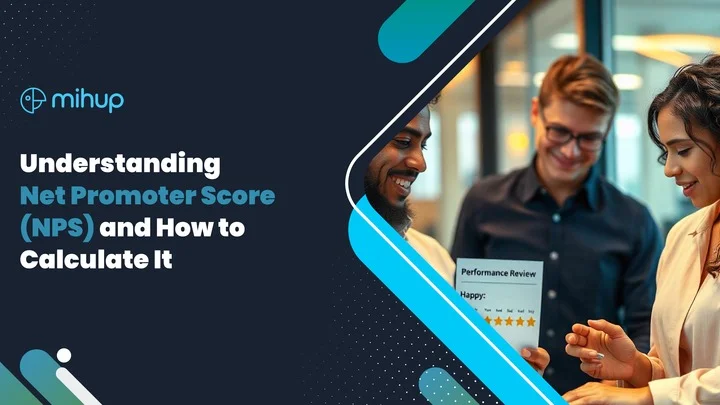Customer loyalty and satisfaction are essential for any successful business. Among the many metrics available, Net Promoter Score (NPS) stands out as a reliable and straightforward measure of customer sentiment. But what exactly is NPS, how is it calculated, and how can businesses use it to drive growth and loyalty? This guide offers a clear and professional overview of NPS, its importance, and practical strategies for implementation.
What is Net Promoter Score (NPS)?
Net Promoter Score (NPS) measures how likely customers are to recommend your brand, product, or service to others. It goes beyond a simple number, reflecting customer satisfaction, loyalty, and advocacy. NPS is based on a single, crucial question:
“On a scale of 0 to 10, how likely are you to recommend our brand to a friend or colleague?”
Responses are categorized into three groups:
- Promoters (9-10): Loyal enthusiasts who will drive positive word-of-mouth and repeat business.
- Passives (7-8): Satisfied but unenthusiastic customers who are susceptible to competitors.
- Detractors (0-6): Unhappy customers who can harm your brand through negative feedback.
How to Calculate Your Net Promoter Score
Calculating NPS is straightforward:
NPS = (% of Promoters) – (% of Detractors)
Step-by-Step Example:
Imagine you survey 100 customers with the following responses:
- Promoters: 70 respondents (70%)
- Passives: 20 respondents (20%)
- Detractors: 10 respondents (10%)
Using the formula:
NPS = 70% – 10% = 60
Your Net Promoter Score is 60, indicating strong customer loyalty. NPS ranges from -100 (all detractors) to +100 (all promoters).
Tools to Simplify the Process
Use online NPS calculators to streamline your calculations. These tools allow you to input your response data and instantly provide an accurate score.
Why Calculate NPS?
Understanding your NPS offers numerous benefits:
- Gauge Customer Loyalty: Assess how satisfied and loyal your customers are.
- Drive Strategic Insights: Inform decisions on product development, customer service, and marketing.
- Benchmark Against Competitors: Compare your performance with industry standards.
- Enhance Retention Strategies: Address detractors’ concerns to convert them into promoters.
Gathering Feedback for NPS
Best Practices for NPS Surveys:
- Timing Matters: Send surveys soon after key interactions, like purchases or service calls.
- Follow Up: Engage with respondents, especially detractors, to show their feedback is valued.
- Keep It Simple: Focus on the core NPS question with a few follow-ups to avoid overwhelming customers.
Enhancing NPS Surveys:
- Why Questions: Ask, “Why did you give this score?” to uncover key drivers of customer sentiment.
- Experience Metrics: Inquire about specific aspects of the customer journey, such as ease of use or feature satisfaction.
- Integrate Operational Data: Combine survey responses with data like website analytics to identify patterns and trends.
Analyzing and Improving Your NPS
Once you have your NPS, the next step is to turn data into action:
- Address Detractors: Reach out to dissatisfied customers to resolve their issues and rebuild trust.
- Engage Passives: Find ways to enhance their experience and convert them into promoters.
- Reward Promoters: Strengthen relationships with loyal customers through exclusive rewards or recognition programs.
- Benchmarking and Continuous Improvement
Compare your NPS against industry benchmarks to identify growth areas. Regular tracking and analysis help monitor progress and refine strategies to boost customer satisfaction over time. - Using NPS to Drive Long-Term Growth
An NPS above 50 is generally excellent, but context matters. Evaluate your score alongside competitors and customer expectations to set realistic improvement goals. Establishing a feedback loop ensures continuous monitoring and refinement of your customer experience strategy. - Leveraging Conversational Intelligence to Enhance NPS
Integrating conversational intelligence with your NPS framework provides a significant advantage. Conversational intelligence uses AI-driven tools to analyze customer interactions, uncover actionable insights, and enhance engagement. This technology offers a deeper understanding of customer sentiments and behaviors.
How Conversational Intelligence Transforms NPS Analysis:
- Pinpointing Drivers of Customer Sentiment: Analyze customer interactions to identify themes and trends behind NPS scores.
- Real-Time Sentiment Analysis: Continuously monitor customer sentiment across all touchpoints, allowing for agile responses.
- Closing the Feedback Loop: Automatically categorize feedback and suggest prioritized actions to address key issues.
- Enhancing Personalized Customer Engagement: Use predictive analytics to identify potential promoters or detractors and engage them proactively.
Why Choose Mihup for Conversational Intelligence?
Platforms like Mihup offer advanced conversational intelligence features:
- Comprehensive Analysis: Use AI to delve into customer interactions for meaningful insights.
- Actionable Dashboards: Visualize trends and patterns through user-friendly interfaces.
- Scalability: Integrate seamlessly with existing CRM and support systems.
- Proactive Alerts: Receive automated notifications for emerging concerns, enabling timely intervention.
By combining Mihup’s capabilities with your NPS framework, you can effectively track customer loyalty and drive continuous improvements.
Scaling NPS Insights Across Your Organization
To scale NPS insights, ensure that feedback translates into meaningful actions across all departments. Focus on collaboration, technology, and a customer-first mindset.
1. Creating Cross-Functional Alignment:
- Marketing Teams: Use promoter insights to craft positive campaigns and address detractors’ concerns.
- Product Development: Incorporate customer feedback into product enhancements.
- Customer Support: Equip support teams with insights to handle common complaints effectively.
2. Real-Time Monitoring and Alerts:
Implement tools that offer real-time NPS tracking with automated alerts. This allows teams to:
- Take Timely Action: Address negative feedback immediately.
- Analyze Trends: Identify recurring patterns or emerging concerns.
- Make Informed Decisions: Use real-time data to improve the customer experience swiftly.
3. Building a Feedback-Driven Culture:
Embed a feedback-driven culture by:
- Ensuring Transparency: Share NPS results and customer feedback regularly with all employees.
- Recognition: Celebrate teams or individuals who significantly improve NPS.
- Continuous Learning: Provide workshops and training to help teams interpret NPS data and implement strategies effectively.
Case Study: Transforming a Business with NPS
A leading e-commerce platform initially had an NPS of 15, indicating significant room for improvement. Customers cited inconsistent delivery times and poor post-purchase communication as major issues. By leveraging NPS feedback and implementing strategic changes, the company achieved remarkable results.
1. Challenges Identified:
- Delivery Delays: Unreliable delivery schedules eroded customer trust.
- Lack of Transparency: Minimal communication about order status left customers uncertain.
- Generic Rewards Program: Existing rewards were not personalized, failing to engage loyal customers.
2. Strategic Actions Taken:
- Optimized Logistics: Streamlined delivery processes to enhance reliability and reduce delays.
- Proactive Communication: Implemented automated updates to keep customers informed about their orders.
- Personalized Rewards: Redesigned the loyalty program to offer tailored promotions and exclusive offers.
- Customer Support Training: Empowered support teams with resources to address complaints effectively.
3. Results Achieved:
- NPS Improved to 45: A 30-point increase reflected significant improvements in customer satisfaction and loyalty.
- Increased Customer Retention: More promoters contributed to higher retention rates and repeat business.
- Positive Brand Advocacy: Loyal customers began sharing favorable reviews and recommending the platform to others, driving organic growth.
This case study illustrates the transformative potential of NPS when combined with a systematic approach to feedback analysis and action.
Conclusion
Net Promoter Score (NPS) is more than just a metric—it’s a powerful tool for understanding and enhancing customer loyalty. By actively tracking and analyzing NPS, businesses can identify key drivers of customer satisfaction, address pain points, and foster strong, lasting relationships.
In today’s fast-paced digital landscape, traditional methods of gathering customer feedback are evolving, and tools like Mihup.ai are leading the charge. By leveraging conversational intelligence, Mihup.ai analyzes customer interactions across multiple touchpoints, providing deeper insights into sentiment, behavior, and preferences. This transformative technology empowers businesses to act swiftly and effectively, turning raw feedback into actionable strategies.
Conversational intelligence ensures real-time monitoring, identifies root causes of dissatisfaction, and delivers predictive insights that enable businesses to anticipate customer needs. With Mihup.ai, organizations can go beyond surface-level NPS analysis, unlocking the potential to personalize experiences, close the feedback loop efficiently, and elevate customer satisfaction.
Start your journey toward customer-centric growth today. Use NPS to listen to your customers, embrace innovative solutions like conversational intelligence, and make informed decisions that transform detractors into promoters. With the right tools and a commitment to continuous improvement, you can deliver exceptional customer experiences and achieve long-term success.





